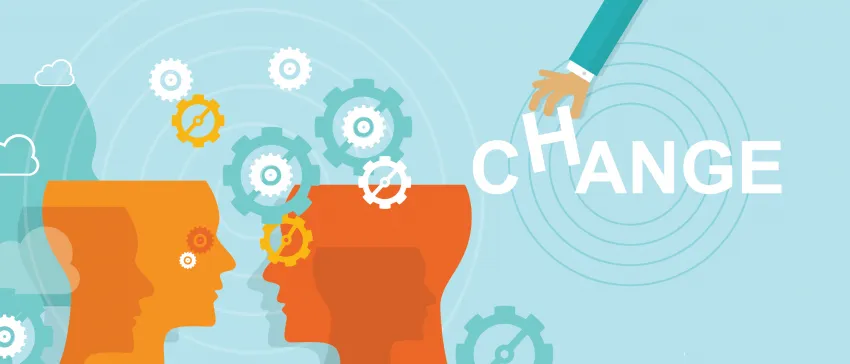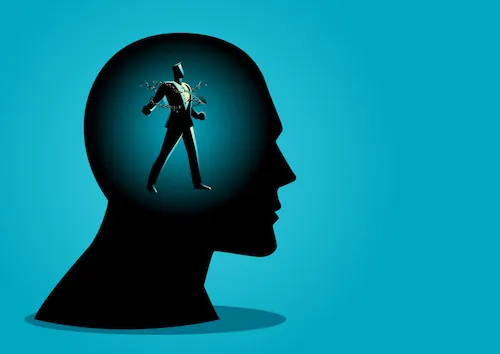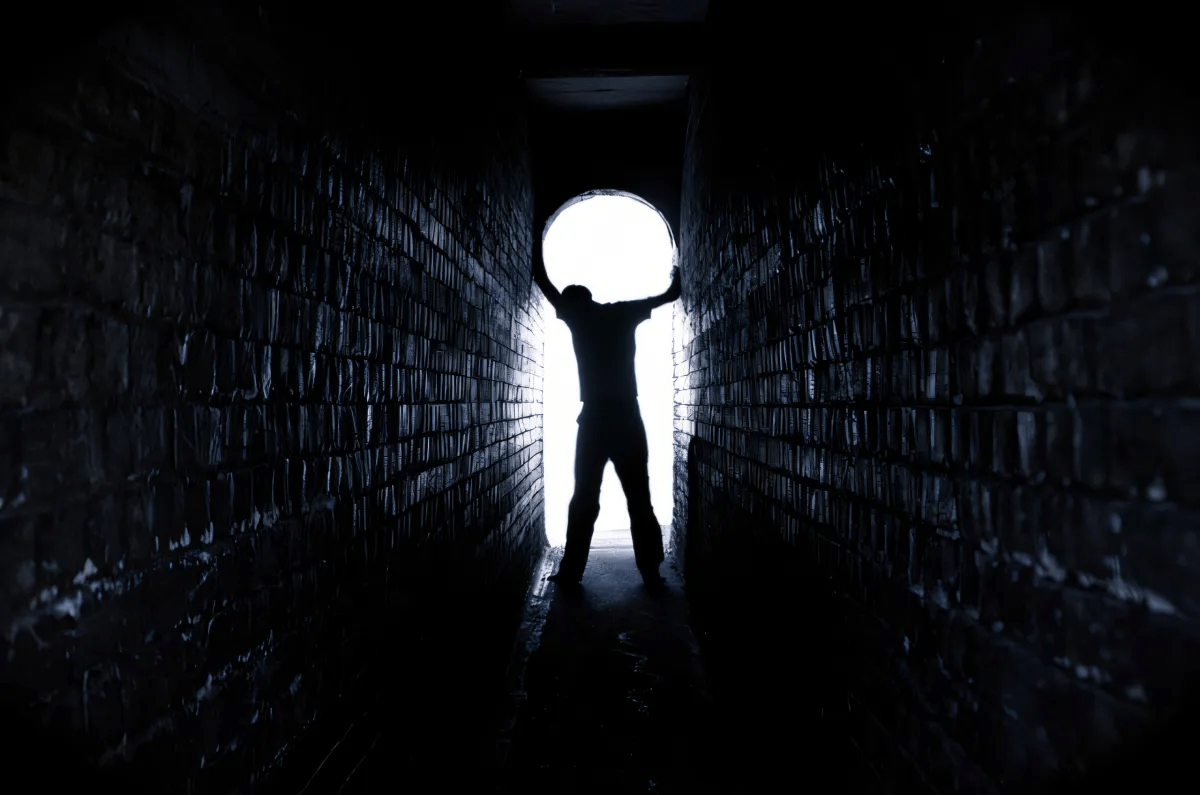Why The Real Changes In Life Always Come From Within You And Not From The Outside World
"Life's picture is constantly changing. The spirit beholds a new world every moment". - Rumi

Where do real changes in life come from?
Have you ever wondered why your life is the way it is? What are the positive and negative factors that have influenced your decisions? How your life could have been different, and what has possibly gone wrong? We all ask such questions to ourselves at a certain moment in our life, wishing for a change, for something better, something that would free us, give us strength, and live our lives the way we want; lead a meaningful life.
There are people that such thing they expect from the outside world, and if something goes wrong they blame others, circumstances, destiny, or God. Some people want to change their life, they try all sorts of things, such as yoga, meditation, reading self-help books, trying to apply positive thinking in their lives, and hope for a change, but it doesn't happen immediately just by doing one of these activities as if using a magic wand, nor does it happen from the external factors.
Real change can never happen if we don't change our way of thinking and viewing the world. To happen a real transformation, we need to view our life in a new light. Our thoughts lead us to action, and change first takes place in the mind. When we have a more positive approach to life situations, our behavior naturally changes effortlessly.
If someone wants to change something in his life or the world he leaves, he has to start first from himself. He has to analyze himself and take time for self-reflection. It is important for each one of us to dig deeper to see clearly where we want to make the difference.
How do I change from within?

Any time we discuss change and especially personal change, it's all about on the inside. Our beliefs, values, and outlook need to broaden and grow. The outside drastic changes such as changing jobs, houses, or moving to another city will not change us on the inside.
It is important to know that the outer change is not the same as the inward change. Wherever we may go and whatever we may do, we take ourselves along with us, which means we carry our beliefs, values, fears, triggers, perspectives, feelings, anger, joy, and experiences and how they have shaped us. Change from within doesn't require creating change but allowing it to happen.
To change yourself from the inside, doesn't mean to change who you are, but to embrace a better version of what you could be. It requires looking deep inside yourself, and have the courage not to turn away. Take a look at yourself and look at your beliefs, identify them and analyze them. Where they came from? How were they developed inside you? Did you have any benefits for them, or not?
To find out and analyze the root of your ingrained beliefs can be a life-changing experience. It means becoming conscious and opening your eyes. To do that, and change from within, you have to practice self-reflection, looking into your past analyzing your actions and why you acted like that, and consider the impact your action had upon you and those around you.
Self-reflection is a practice to address your beliefs, become conscious of them, and then take action. It is all up to you to change your behavior. People who practice self-reflection increase their self-awareness. You have to change yourself if the ingrained behavior doesn't serve you, especially if it harms you and those around you, and anyone can do that.
How do I change myself completely mentally?

Time goes by for every one of us, the only permanent thing in our life is change, but this doesn't necessarily mean people are used to it or accept it completely. Sometimes we don't like change and refuse to accept it or put off dealing with it. Our denial may protect us in a lot of ways, however, if we take a stand and accept change can be better and less stressful than putting it off.
Change is not always pleasant, it carries a lot of stress for us all, whether we are talking about positive like a promotion or negative one like losing your job. Stress is just the reaction our bodies have against change. Even in life pleasant situations such as becoming a parent can be stressful.
When change happens, our life is not the same as it used to be, so we need to stick to a regular schedule as much as possible. Things you used to do every day such as walking the dog at 8 am, remind us that there are things that can't change, they remain the same.
All this gives our brains a little bit of rest. If you are going through a lot of change in your life, then it is advisable to write your routine and check during everyday activity or work. Your brain will have one less thing to hold inside
Eating healthy can boost our mental wellbeing, we need carbs,- bread, muffins, cake, etc. They boost serotonin, a brain chemical that is reduced when we experience stress.
Another activity that helps change is exercising, doing it two or three times during the week, can have a positive impact on decreasing symptoms of depression. Even just a walk around the neighborhood lifts our mood. Just get out and move, in this way you will be more motivated when you are active.
Stress and its negative consequences can harm us, this is not a sign of weakness, but a sign of trying to remain strong beyond human power, or trying to remain strong for too long. Thus, asking for help from a loved one or a specialist is completely normal and maybe the most right thing to do.
Another good activity or technique is writing down the positives outcomes from this change. Maybe new people entered your life, or now you have healthier habits, or now you know to give priority to the most important things in life. Change is a great opportunity to grow, which means better results.
Be proactive rather than reactive. Proactive means taking charge and working preventatively, which means knowing what steps to take before something happens. Reactive means waiting and taking action after things have happened
Stay away from social media. During change, you may be inclined to post on Facebook what happens in your life. If you choose to do so, make sure you are in a calm state - and always remember that whatever you post, it never really disappears.
People on social media tend to compare their lives with one another, but what they post is their best, not stressful moments. This way they create the impression that everybody else is doing fine, but it is not so. Everyone has struggles to deal with, so better quit comparing your life with others.
As per the research conducted by Psychology Today, they relate several techniques on how to change mentally.
How do you handle changes in yourself?

There has long been a myth that talking often about past problems will make things right. Unfortunately, researches show that if you keep repeating the negative emotions and experiences, will delay your adaptation process in the present. However, this doesn't mean to "suck it up" or completely ignore your troubles.
It actually means becoming aware of how dwelling on your past problems will not let you think and move on with your life. See for practical advice about what is the next right thing to do, you have to keep your focus on the problems you can solve, instead of complaining about the ones you can not.
Another element we have to keep in mind is our attitude toward stress. Kelly McGonigal, a Standford psychologist says our stress reaction can have a greater impact on our health and success than stress itself. If you believe it will destroy you, it will, but if you believe you will make it through a hard life situation, you will be more resilient and live longer.
When you feel stress in your life, ask yourself what is the benefit of it and why you feel like this. Will it help you reach something? Or succeed in something in your life? A job interview? A hard situation in your current job? Or become more empathic with your colleagues? Or is stress a way out of a toxic situation? It can be good if you see the silver linen in it.
To handle changes in yourself as best as possible, focus on your values instead of fears. Keep in mind what are the things that matter the most in life - family friends religious convictions, career, etc. It all can protect us from the troubles ailing us. But forgive and let go is better to free yourself from the pains and anger from the past. This is a real change for the better.
We cannot control change from happening, but we can control our reaction to it, which will make all the difference in your life. Here is a real-life example from someone who has suffered terribly.
When he returns home, Victor Franks, a Nazi death camp survivor, finds all his family dead, mother, brother, wife, and unborn child. His life changed tragically, he couldn't get back the life he had, but he was free to create another one, meeting new friends, find another love, and create another family. He could work with his new patients and build his new life rather than being stuck in his tragic life for the rest of his life. Frank called his hope in face of despair "tragic optimism."
This is something extreme, but we can look for inspiration from it. If we focus on the change limitations we will give in to worry, bitterness, and despair. Instead of that accept change as part of life, and see what you can do next.
What creates a real change?

a therapist, during her work with patients, the first thing she asks whenever she has a new patient is "What do you want to change about yourself that will make a big difference in your life or your relationship?" she stresses that the most meaningful changes we can make are changes involving ourselves. Just wishing to change will not work if you do not put that change into practice repeatedly. The repeated experience shape our thoughts, feelings, and the way we react, which can turn into a habit.
It all depends upon our brain structure. Simply said, if you walk a path every day, it becomes well-trodden, so it is the same if you activate a pathway in your brain it will be increasingly engrained, to the point you won't think of something else. The more you bring an experience, thought, action, emotion from your past, the linkage becomes stronger which will be embedded in the physical structure of your neurons.
It's quite easy to get stuck in bad mental habits, if you keep repeating a mental belief continually in your mind, it will be hard not to believe, even if your rationality knows the truth. Thoughts like being hopeless, not good enough, feeling abandoned, or powerless if you return a negative belief it will reinforce it in your mind and you will not be able to think of something different.
But the good news is that just as we can build accidentally bad neurons habits, so we can consciously create good ones. The brain's structure can always change for the better. We all can create our patterns of thinking, acting, and feeling. It is all up to you and you have the power to decide what kind of person you want to be in your life - and by revising that idea, connect it with emotions and actions, it will become reality.
It takes a lot of continuous effort to build new strong pathways. You must be prepared to act, think, and feel something new continually. It is not "fake it until you make it," it actually is a strategy that works. It will work better and faster if you put emotions during the success of your mission.
Experiences about change from what I personally encountered in my life.
I have known different kinds of people in my life, whose life wasn't perfect. Some had stress disorders, while some of them had to struggle with different addictions, such as tobacco, alcohol, porn addiction, and marijuana, etc.
But all of them had one thing in common, to break free from their pains, and change their lives, they all needed to strengthen their willpower and resilience. The outside world helped them a bit, but the biggest struggle they had to face was with themselves.
For example, an acquaintance of mine wasn't allowed to drink alcohol at all due to his Parkinson's disease, in most of the cases when he was offered alcohol he couldn't refuse it. The outside world will never be perfect to suit your needs, it is your duty to adapt yourself as best as possible not to damage yourself.
It was people's fault to offer him alcohol even though they knew he wasn't permitted to approach it, but it was his fault to accept it, so he carried a responsibility upon himself, and like many others, he wasn't blame-free.
The same thing goes for other people I have met who struggle with different types of addiction. Even though doctors and therapists warn them to stay away from their drugs, it is their weakness that makes them relapse.
Doctors and therapists could not help those people who cannot help themselves, just because they enjoy their addiction. Addiction is hard to break free from it, but not impossible. It was their duty to cooperate with their doctors so that they could break free, heal themselves, and develop their full potential.
I have known others who although have gone through hell, but felt a responsibility upon themselves to take control of their life, and delete the negativity they experienced. Thanks to the wisdom they developed through life, and their determination, they became a better version of themselves, much stronger, purer, and freer.
Final thoughts
We must also keep in mind that humans and every living being is in constant evolution. Everything in this life is in constant change and progress is related to reinvention. It doesn't mean to keep reaching successes endlessly. Seeking an achievement means an "end," which means you have reached what you wanted and then you grow no longer.
Reinventions, actually mean that there is no end, there are always endless opportunities to discover new elements about yourself. Exploration of oneself is growth, which doesn't happen outward, but it faces inward.
During the change process, you will have to confront yourself, your behavior, beliefs, and feelings. It is a process that requires courage, and willingness to be vulnerable. While you look at yourself and start to analyze your past actions, you will have to look at the reality and face uncomfortable truths. While you do this, it is important to love yourself unconditionally and be kind to yourself.
If you want to bring change in your life for the better then embrace these concepts. Don't rush yourself, but take small steps consistently, every day, and don't stop. To accomplish change in your life, you may go backward and forwards, but don't give up. Learn and be aware of how change works.
References:
- ALL WAYS UP FOUNDATION. The Only Real Change Comes From Inside. ALL WAYS UP FOUNDATION. n.d. https://www.myallwaysup.org/single-post/2019/03/22/the-only-real-change-comes-from-inside-j-cole
- Anah. CHANGE FROM WITHIN. Anah Health & Wellness leadership speaker. April 12, 2020. https://anahaikman.com/change-from-within/
- Cole, Nicolas. 7 Steps to Transform Yourself From Who You Are to Who You Want to Be. Inc.com. October 10, 2016. https://www.inc.com/nicolas-cole/7-steps-to-transform-yourself-from-who-you-are-to-who-you-want-to-be.html
- Kauppi, Martha. What Creates Change. Institute for Relational Intimacy. September 4, 2019. https://instituteforrelationalintimacy.com/what-creates-change/
- Paavilainen, Heidi. Where does change come from? - And how to change your life more effortlessly. HEIDI PAAVILAINEN. n.d. https://heidipaavilainen.com/change-your-life/
- Real-life practices Continuous improvement. Real-life practice. October 15, 2020. https://www.reallifepractice.com/2020/10/real-change-enduring-change-happens-one-step-at-a-time-ruth-bader-ginsburg/
- Rumi quoted in AZQUOTES. "Life's picture is constantly changing. The spirit beholds a new world every moment." https://www.azquotes.com/author/12768-Rumi/tag/change
- Sarkis, Stephanie A. Ph.D. 10 Ways to Cope With Big changes. Psychology Today. January 19, 2017. https://www.psychologytoday.com/us/blog/here-there-and-everywhere/201701/10-ways-cope-big-changes
- Tasler, Nick. How to Get Better at Dealing with Change. HARVARD BUSINESS REVIEW. September 21, 2016. https://hbr.org/2016/09/how-to-get-better-at-dealing-with-change
Opinions and Perspectives
Appreciate how the article balances theory with practical advice for implementing change.
The concept of tragic optimism offers a powerful framework for handling difficult changes.
Fascinating how our belief about stress impacts its effect on us. I'm going to try viewing it differently.
The article really emphasizes personal responsibility in a way that feels empowering rather than blame.
Important reminder that change is constant and fighting it only creates more stress.
The section about self-reflection has inspired me to start journaling again.
Valuable insight about how positive change requires both emotional investment and repeated action.
The neuroplasticity information helps explain why old habits are so hard to break.
Powerful message about how we can't control change but can control our reaction to it.
The distinction between outer and inner change is crucial. I've moved cities thinking it would fix everything.
Really appreciated the practical examples of how to implement internal change.
The article could have addressed more about dealing with resistance from others when making personal changes.
Found myself nodding along with the advice about maintaining routines during major life changes.
The section about proactive change management has really changed how I approach transitions.
Interesting perspective on how change doesn't mean changing who you are, but becoming a better version of yourself.
The part about creating new mental patterns through repetition gives me hope for breaking old habits.
Would have liked more discussion about how to maintain motivation during long-term change processes.
The connection between thoughts and actions is key. I've noticed my behavior shifts naturally when I change my thinking.
Appreciate the emphasis on self-love during the change process. We often forget that part.
The article made me realize how much I've been waiting for external circumstances to change instead of looking inward.
I found the section about stress response particularly helpful for my current situation.
Something powerful about the idea that we carry ourselves wherever we go. Can't run from internal work.
The comparison between ingrained beliefs and well-trodden paths makes so much sense to me now.
Good point about how dwelling on past problems can hinder present growth. I needed to hear that.
Wish the article had more specific techniques for maintaining changes once we make them.
The concept of continuous exploration rather than reaching an end point resonates deeply with me.
Really connected with the idea that progress isn't linear. The back and forth nature of change is something I've experienced.
I wonder if focusing too much on internal change can make us ignore important external factors we should address.
Important point about facing uncomfortable truths while being kind to yourself. That balance is crucial.
The article could have addressed more about the role of community in supporting internal change.
Try linking self-reflection to an existing habit. I do mine during morning coffee and it's become much more consistent.
Anyone else find it challenging to maintain self-reflection practices? I start strong but always seem to fall off.
The section about creating good neural habits gives me hope. It's never too late to change our thought patterns.
I appreciate the emphasis on small, consistent steps rather than dramatic transformations. That feels more achievable.
The part about tragic optimism really moved me. It shows how we always have a choice in how we respond to circumstances.
Interesting how the article distinguishes between achievement and reinvention. Never thought about it that way before.
The advice about staying away from social media during major life changes is spot on. I wish I'd known this during my career transition.
I question whether all meaningful change must come from within. Sometimes external factors can catalyze important internal shifts.
The bit about brain pathways and habits is crucial. Understanding this has helped me be more patient with my own change process.
I found the section about addiction particularly insightful. It really emphasizes how external support only works when matched with internal commitment.
You might be focusing too much on willpower alone. The article suggests combining emotional engagement with repeated actions for lasting change.
The article talks about willpower but doesn't address how difficult it is to maintain lasting change. I've tried many times and failed.
Fascinating point about how stress reaction matters more than stress itself. Makes me think about how I approach challenges differently now.
The concept of proactive versus reactive change management makes so much sense. I've always been reactive but trying to work on that.
Love the practical advice about writing down positive outcomes from change. I started doing this recently and it's helped shift my perspective.
What stood out to me was the emphasis on self-reflection. We often avoid looking inward because it's uncomfortable.
The part about social media comparison really hit home. I've had to limit my time online because it was affecting my personal growth journey.
Actually, I think the Victor Franks story illustrates perfectly how internal change can happen even in the most challenging external circumstances.
The Victor Franks example feels a bit extreme to me. Not everyone faces such dramatic circumstances to make changes in their lives.
I agree with maintaining routines during periods of change. When I went through a difficult transition, keeping my morning routine helped me stay grounded.
Interesting how the article connects neuroplasticity to personal change. Our brains literally rewire themselves when we create new thought patterns.
The Rumi quote at the beginning is so powerful. Each moment really does bring a new perspective if we're open to seeing it.
I struggled with the concept that all change comes from within. Sometimes external circumstances force us to change whether we want to or not.
Really resonated with the idea that true transformation starts in our minds. I've noticed this in my own life where shifting my perspective made more impact than external changes.
